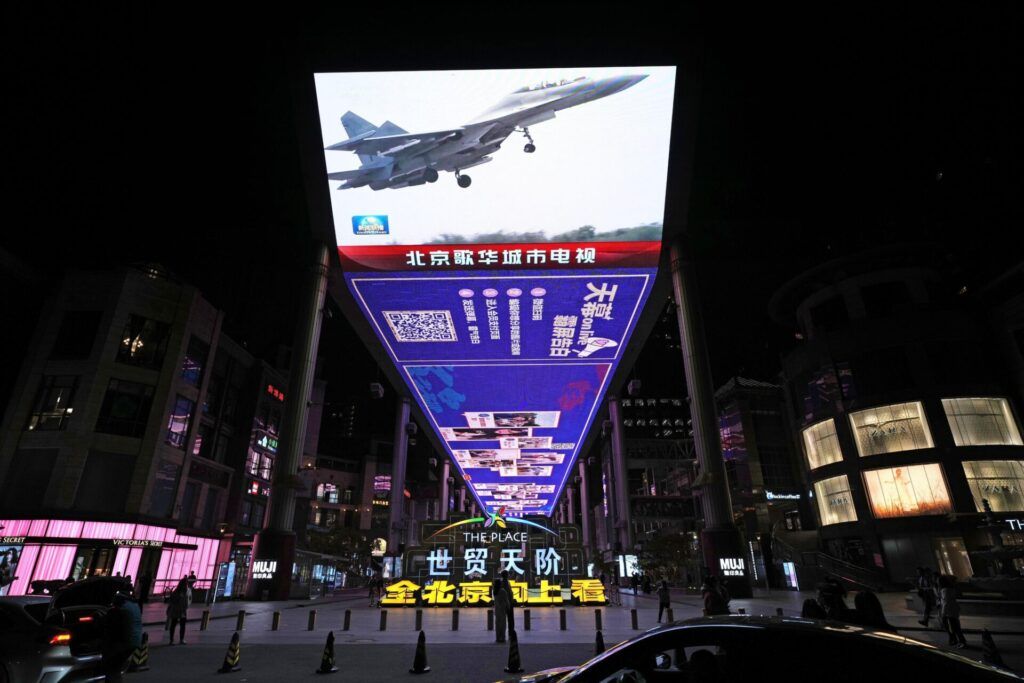How to manage and de-risk an emerging Cold War II with China
By Robert Daly, Robert Litwak | June 26, 2024
 A large screen on a street in Beijing shows a Chinese military plane participating in a three-day air and sea exercise around Taiwan that began on April 8, 2023. (Photo by Kyodo News via Getty Images)
A large screen on a street in Beijing shows a Chinese military plane participating in a three-day air and sea exercise around Taiwan that began on April 8, 2023. (Photo by Kyodo News via Getty Images)
At their meeting last November, US President Joe Biden and China’s General Secretary Xi Jinping agreed to resume dialogue to promote peace. But the first real test of their tentative comity, Taiwan’s May presidential election, brought saber-rattling from Beijing. China’s large-scale naval and air exercises around the island that Biden has vowed to defend echoed the Cuban Missile Crisis and underscored that Taiwan is the epicenter of a new Cold War.
In the early phase of this rivalry, neither Biden nor Xi shows any sign of reconsidering his nation’s goals, strategies, assessments of the other, or desire to shape global norms. Both powers want to avoid war, but not at the cost of questioning their interests or values. Each is determined to neither fight nor lose.
The only strategy open to them, therefore, is to build a framework for peaceful rivalry. The first steps will be hard, as each country believes it has the upper hand, and each rejects the other’s key concepts for international order.
The difficulty is compounded by disparate historical premises. America’s 20th century narrative cast the United States as a global savior in two world wars and the first cold war. This legacy of righteous victory, founded on wealth and love of freedom, justifies Washington’s continued assertion of global leadership in the United States and beyond.
China’s experience during the same period was of victimhood—famine, warlordism, the Japanese invasion, civil and class warfare—followed by the largest, fastest economic rise in human history. This triumphant story of a benighted nation that rose to rival the resident superpower underlies China’s campaign to win deference in the Western Pacific and lead the Global South.
True, China and the United States fought as allies in World War II, but their interpretations of that conflict varied at the time and in retrospect. Most aspects of the Western war, including the formative trauma of the West’s 20th century, the Holocaust, meant little to China. (There is still no word for Holocaust in common use in Mandarin.) For Westerners, hallmarks of modern Chinese history like the Xinhai and Cultural Revolutions and Deng Xiaoping’s 1992 Nanxun have little meaning.
Not only have the United States and China embarked on a new Cold War with disparate histories, they have begun a new arms race with incompatible nuclear doctrines and military/strategic cultures.
As China modernizes and expands its nuclear arsenal, furthermore, the balance of terror is becoming less stable and the competition extends to the ungoverned domains of outer space and cyberspace. Emerging technologies, such as hypersonic weapons and artificial intelligence, create new dislocations and new dangers of escalation in a crisis.
Nuclear arms control negotiations between the United States and the Soviet Union in the early 1970s yielded landmark agreements that codified the principles of parity and mutual deterrence based on vulnerability as the foundation of strategic stability. China has studied, but did not participate in, that shared strategic learning process—yet another conceptual/experiential gap that will stymie risk reduction efforts from the outset
Beijing’s position is that there is no strategic parity between the powers that would justify launching a strategic dialogue; intense competition is the unilateral choice of the United States, which has imposed it on the geopolitically innocent developmental state that is the People’s Republic. To ensure peace, the United States need only accept that a China-centric Eurasia is natural, inevitable, and desirable.
How can effective dialogue begin under such circumstances?
For Washington, the key is to ignore conceptual barriers and appeal to China’s unquestionable interest in avoiding an arms race with the United States that could escalate during a crisis. The appeal should be public, tailored to American, Chinese, and international audiences, and should avoid attacking China’s political system or blaming it for the current state of affairs.
Secretary of Defense Lloyd Austin made a good start in declaring that “war with China is neither imminent nor unavoidable” and emphasizing that both sides have an interest in ensuring that “there are no misperceptions and no miscalculations … that can spiral out of control.” The next challenge is to set a date for the launch of talks with no preconditions and to pursue them through the crises that surely lie ahead.
Talks must begin now because the risks of Cold War II are increasing. China’s emergence as a peer nuclear power and the erosion of US conventional military superiority in northeast Asia could lead Xi Jinping to engage in what Nobel Prize-winning strategist Thomas Schelling called “a competition in risk-taking.”
A lack of common interests, narratives, and strategic concepts, exacerbated by domestic political pressures in each of the fragile superpowers, is increasing the chances of a war that neither side wants. If it is possible for Washington and Beijing to find common cause without a new Cuban Missile Crisis, they must set aside facile criticism of “dialogue for dialogue’s sake” and rediscover patient, determined diplomacy.
Together, we make the world safer.
The Bulletin elevates expert voices above the noise. But as an independent nonprofit organization, our operations depend on the support of readers like you. Help us continue to deliver quality journalism that holds leaders accountable. Your support of our work at any level is important. In return, we promise our coverage will be understandable, influential, vigilant, solution-oriented, and fair-minded. Together we can make a difference.
Keywords: China, Cold War II, Joe Biden, United States, Xi Jinping
Topics: Analysis, Nuclear Risk
















